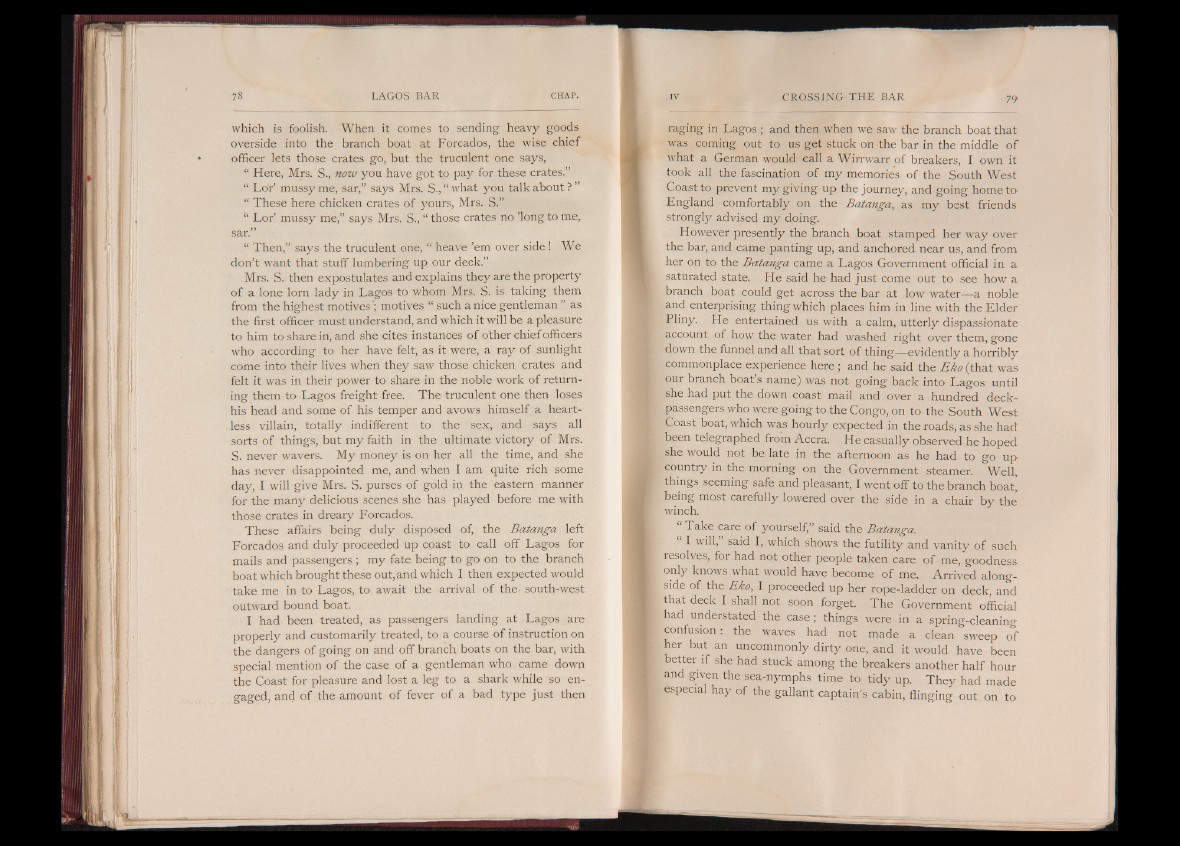
which is foolish. When it comes to sending heavy goods
overside into the branch boat at Forcados, the wise chief
officer lets those crates go, but the truculent one says,
“ Here, Mrs. S., now you have got to pay for these crates.”
“ Lor’ mussy me, sar,” says Mrs. S., “ what you talk about ? ”
“ These here chicken crates of yours, Mrs. S.”
“ Lor’ mussy me,” says Mrs. S., “ those crates no ’long to me,
sar.”
“ Then,” says the truculent one, “ heave ’em over side! We
don’t want that stuff lumbering up our deck.”
Mrs. S. then expostulates and explains they are the property
of a lone lorn lady in Lagos to whom Mrs. S. is taking them
from the highest motivesmotives “ such a nice gentleman ” as
the first officer must understand, and which it will be a pleasure
to him to share in, and she cites instances of o ther chief officers
who according to her have felt, as it were, a ray of sunlight
come into their lives when they saw those chicken crates and
felt it was in their power to share in the noble work of returning
them to Lagos freight free. The truculent one then loses
his head and some of his temper and avows himself a heartless
villain, totally indifferent to the sex, and says all
sorts of things, but my faith in the ultimate victory of Mrs.
S. never wavers. My money is on her all the time, and she
has never disappointed me, and when I am quite rich some
day, I will give Mrs. S. purses of gold ip the eastern manner
for the many delicious scenes she has played before me with
those crates in dreary Forcados.
These affairs being duly disposed of, the Batanga left
Forcados and duly proceeded up coast to call off Lagos for
mails and passengers ; my fate being to go on to the branch
boat which brought these out, and which I then expected would
take me in to Lagos, to await the arrival of the- south-west
outward bound boat.
I had been treated, as passengers landing at Lagos are
properly and customarily treated, to a course of instruction on
the dangers of going on and off branch boats on the bar, with
special mention of the case of a gentleman who came down
the Coast for pleasure and lost a leg to a shark while so engaged,
and of the amount of fever of a bad type just then
raging in Lagos ; and then when we saw the branch boat that
was coming out to us get stuck on the bar in the middle o f
what a German would call a Wirrwarr of breakers, I own it
took all the fascination of my memories of the South West
Coast to prevent my giving up the journey, and going home to
England comfortably on the Batanga, as my best friends
strongly advised my doing.
However presently the branch boat stamped her way over
the bar, and came panting up, and anchored near us, and from
her on to the Batanga came a Lagos Government official in a
saturated state. He said he had just come out to see how a
branch boat could get across the bar at low water-&a noble
and enterprising thing which places him in line with the Elder
Pliny. He entertained us with a calm, utterly dispassionate
account of how the water had washed right over them, gone
down the funnel and all that sort of thing:— evidently a horribly
commonplace experience here ; and he said the Eko (that was
our branch boa.t s name) was not going back into Lagos until
she had put the down coast mail and over a hundred deck-
passengers who were going to the Congo, on to the South West
Coast boat, which was hourly expected in the roads, as she had
been telegraphed from Accra. He casually observed he hoped
she would not be late in the afternoon as he had to go up
country in the morning on the Government steamer. Well,
things seeming safe and pleasant, I went off to the branch boat,
being most carefully lowered over the side in a chair by the
winch.
“ Take care of yourself,” said the Batanga.
I will, said I, which shows the futility and vanity of such
resolves, for had not other people taken care of me, goodness
only knows what would have become of me. Arrived alongside
of the Eko, I proceeded up her rope-ladder on deck, and
that deck I shall not soon forget. The Government official
had understated the case; things were in a spring-cleaning
confusion: the waves had not made a clean sweep o f
her but an uncommonly dirty one, and it would have been
better if she had stuck among the breakers another half hour
and given the sea-nymphs time to tidy up. They had made
especial hay of the gallant captain's cabin, flinging out on to